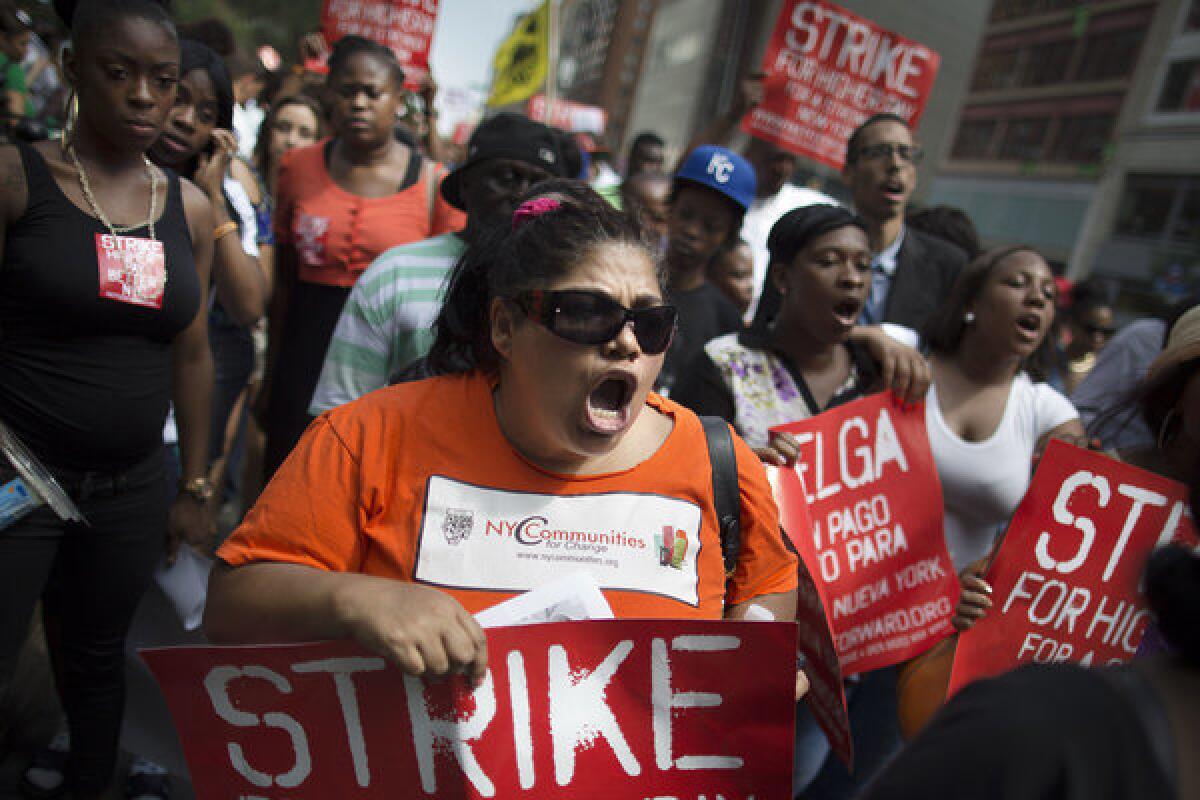Does America need unions? An ex-Wall Streeter says yes

- Share via
Do free-market capitalists need to rethink their position on organized labor? Henry Blodget thinks so. In fact, Blodget wrote Friday, the country may need unions to help the economy grow faster.
Wait, what?
Blodget -- a stock analyst who left Wall Street in disgrace after the dot-com crash -- now runs Business Insider, an online news site known for provocative posts about tech, the economy, politics, celebrities and just about anything else that attracts an audience online. (Not judging, just saying.) Although he’s not anti-corporate America or anti-business, he is something of a populist, particularly where his former livelihood is concerned.
In Friday’s piece, Blodget offers a number of data points to build the case that unions would help reduce the income gap between America’s top earners and the hoi polloi. The clearest of these is a chart showing how the share of U.S. income captured by the top 10% fell dramatically in the 20th century as union membership grew, then rose again as unions declined.
The point is that without unions, workers don’t have the bargaining power necessary to stop employers from paying them as little as the market will allow. Much of the wealth they produce thus goes to their employers’ management and shareholders, not to them.
There’s a decent economic argument for the proposition that income inequality doesn’t really matter; under this view, what matters is whether the economy is growing and lifting people’s fortunes at the lower end of the scale, regardless of what’s happening at the top. Blodget counters that when too much wealth flows to those at the top, it’s a brake on growth:
“Right now in this country, we have the painful juxtaposition of the highest corporate profit margins in history, combined with one of the highest unemployment rates in history. We also have the lowest wages in history as a percent of the economy,” he wrote. “That’s not good for the economy... because rich people can’t buy all the products we need to sell to have a healthy economy (they can’t eat that much food or drive that many cars, for example). And it’s also just not right.”
There’s no question that the U.S. economy isn’t growing as fast as it should -- witness the steady stream of underwhelming jobs reports, such as the one released Friday. Blodget is essentially arguing that employers (and shareholders) don’t or can’t see how much better off their companies would be if profits were lower and wages were higher.
The argument is premised on the belief that the market is failing in a profound way. It assumes that individual companies suffer from a sort of tunnel vision, incapable of seeing beyond their short-term profits and losses to recognize the damage being inflicted on the larger economy.
I’m sympathetic to that view, but I also think the U.S. workforce is victimized by its own shortage of skills and mobility. When someone holds a minimum-wage job for multiple years, that reveals something about the employee as well as the employer. It’s also worth exploring why so many of the jobs being created are in the lower-paid service industry; retailers and restaurants were responsible for more than half of the 162,000 new jobs in July.
One other point that Blodget doesn’t make in his piece: Unionizing more of those workplaces would apply a significant amount of upward pressure on wages, which would also put upward pressure on prices. That could open the door to inflation, a scourge that this country has largely avoided since the early 1980s.
Then again, wage increases that reflect gains in productivity aren’t inflationary. And increases in productivity haven’t translated into higher wages since the mid-1970s. That’s about the same time the percentage of U.S. workers in unions went into free-fall.
ALSO:
Obama’s trump card on immigration
McManus: Ted Cruz, wacko like a fox
Follow Jon Healey on Twitter @jcahealey and Google+
More to Read
A cure for the common opinion
Get thought-provoking perspectives with our weekly newsletter.
You may occasionally receive promotional content from the Los Angeles Times.










